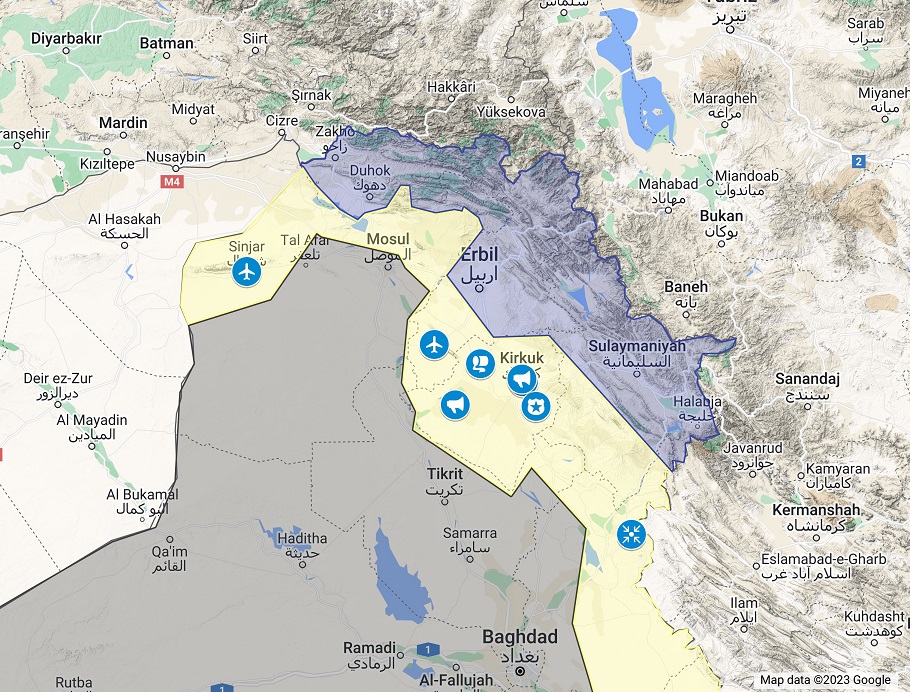1.6K
A biweekly brief of events and news occurred in the disputed territories.
Kirkuk
- On October 6, Jassim Mohammed Aboud, the head of Iraq’s Supreme Court, informed the Iraqi News Agency that the court had suspended the decision to return the Kurdistan Democratic Party’s (KDP) headquarters, citing “the principle of maintaining security and peaceful coexistence in Kirkuk.”The Supreme Court overturned a decision by the Iraqi Prime Minister to return the building to the KDP following a violent protest by ultra-nationalist Arabs and Turkmen, resulting tragically in the death of four Kurdish protesters at the hands of the Iraqi army. The KDP headquarters had been occupied by Iraqi security forces since October 16, 2017.
- According to a report by the local news outlet, Plus24, Iraq’s Accountability and Investigations Board has requested three Sunni Arab and one Turkmen party to replace six candidates ahead of the provincial elections due to their “ties” with the former regime’s al-Ba’ath party. These candidates include Turhan Abdulrahman, the leader of the Iraqi Turkmen Front; Falah Hassan Shalal al-Obaidi; Farhan Jassim; and Azam Saleh Adel al-Hamdani of the Siayada Party; Amir Abdullah Juburi of the Taqadoum Party; and Raja al-Naimi of the Kirkuk Arab Coalition.
- Despite an agreement reached on October 2, Turkey continues to halt Kirkuk’s oil exports, alongside Kurdistan, since March. This export pause stems from Baghdad’s victory in a lawsuit against Turkey, leading to disputes between the two states. On a different note, on October 9, the Iraqi Oil Ministry announced the successful repair of two previously nonfunctional oil wells in Kirkuk by the teams of the Iraqi Drilling Company. These wells, located within the Khabaza and Jambur oil fields, are now ready for oil extraction. Meanwhile, on October 1, the State Organization for Marketing of Oil (SOMO) released statistics on Iraqi oil exports for September. Kirkuk’s oil revenue was $35,054,994 from the export of 449,423 oil barrels to Jordan at an average price of $78 per barrel. Additionally, in September, 473,335 barrels were exported through Basra, generating $36,105,993 in revenue. The oil exported via Basra came from the fields in Mosul, under the jurisdiction of the Northern Oil Company (NOC), and was stored in the Kirkuk oil warehouse.
- On October 1, Iraqi military forces obstructed a convoy led by the leader of the Turkish-backed Turkmen Front, Hassan Turan, from entering Laylan district. The Turkmen Front issued a statement, denouncing “a conspiracy against the Turkmen Front.” At the same time, its leader, accompanied by other members, was en route to open a new party office. The statement read, “The prevention of the Turkmeneli Television crew from heading to the Tal Afar district by the Western Nineveh Operations Command a few days ago is part of the same plan to hinder the Turkmen Front from reaching the Laylan district,” demanding an immediate investigation. Separately, during a television interview with al Rabiayh, the Iraqi President, Latif Rashid, suggested the formation of a local administration in Kirkuk “through consensus” to resolve the political crisis and tensions in the province. Rashid emphasized that adopting the oil and gas law would be key to solving the problems between Baghdad and Erbil.
- On October 5, Kirkuk’s police command announced the arrest of a gang that had been impersonating security personnel while conducting fake security searches during robberies. This criminal group stole $80,000 in a recent store robbery. The gang consisted of four members.
Khanaqin
- On October 10, the Iranian-backed Popular Mobilization Units (PMU) issued a statement announcing the deployment of its forces in the outskirts of the Khanaqin district. The statement stated that the 28th division had been deployed “around Khanaqin” with a primary focus on securing the district against security breaches and potential terrorist attacks. The PMU, in cooperation with Iraqi forces, has maintained control of the district since October 16, 2017, but it has continued to face persistent threats from terrorist attacks.
Makhmour
- On October 7, Turkish drones carried out an airstrike on the Makhmour Refugee Camp, which shelters Kurdish refugees from Turkey. This unfortunate incident resulted in injuries to five camp residents, including a woman and two children. The airstrike specifically targeted a mosque within the camp. In response to the attacks, camp residents organized a protest condemning Turkish violations and preventing Iraqi security forces from entering the camp.
Shingal (Sinjar)
- On October 6, the Turkish National Intelligence Organization (MIT) reported the assassination of Ilyas Ero, a commander of the Sinjar Resistance Units (YBS). The MIT accused the late commander of being associated with the Kurdistan Workers’ Party (PKK). Separately, during a conference hosted by the Erbil-based Middle East Research Institute (MERI), Najim al Jabouri, the governor of Nineveh, highlighted that addressing armed groups represents the most significant security challenge in Shingal. He acknowledged the presence of international competition for influence in the district.

